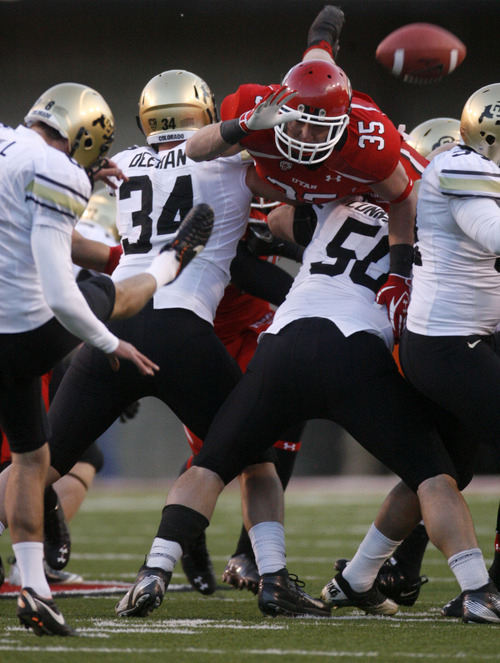This is an archived article that was published on sltrib.com in 2011, and information in the article may be outdated. It is provided only for personal research purposes and may not be reprinted.
His coaches may have cringed when they learned they would be defending a triple-option offense in the Sun Bowl, but Utah safety Greg Bird was thrilled.
That's because Georgia Tech's unconventional scheme makes Bird valuable to the Utes, as a versatile player and good tackler who's generally left out when his team faces a traditional offense. A senior who became a special-teams star during his Utah career, Bird will have one last chance to play a significant role, which he views as a chance to "go out big."
That means limiting the Yellow Jackets to relatively little numbers, in points and rushing yardage. Georgia Tech's offense vs. Utah's defense is a fascinating matchup, because of the Utes' mixed results against the option attacks of Air Force and Navy in recent years and Tech's struggles in bowl games in coach Paul Johnson's first three seasons at the school.
Johnson had just left Navy for his new job in December 2007 when Utah met the Midshipmen in the Poinsettia Bowl. Navy gained 438 total yards in a 35-32 defeat. The Yellow Jackets have not produced anything resembling those numbers in Johnson's bowl losses to LSU, Iowa and Air Force.
The Utes hope that's a continuing trend, based on the theory that having more than one week to prepare for an unusual offense gives defenses an advantage. Ute defensive coordinator Kalani Sitake believes the extra time enables the scout team to become more adept in executing the option, providing a better simulation for the defense.
"It's not such a shock when you go into the game," Sitake said.
Then again, the Utes struggled against Navy in '07, when Gary Andersen was coordinating the defense. A study of Utah's defense against Air Force in Mountain West Conference games over the past decade shows wild variation. The Utes allowed only 53 rushing yards and 191 total yards in their unbeaten season of 2008, but gave up 411 total yards while holding on for a 28-23 victory last year, when they improved to 8-0 at the time.
In any case, the Utes apparently intend to stick with their usual method of defending the option. They will employ Bird as a third safety, basically functioning as a linebacker. "I'm pretty excited about that, looking back on how I played last year," said Bird, who made three tackles and forced a fumble against Air Force.
Of course, he accounts for only 9 percent of the defense. "All 11 guys have to play their responsibility; don't try to do anybody else's job," said coach Kyle Whittingham. "If you have a breakdown anywhere, you're going to be in trouble."
Anchored by All-Pac-12 linemen Star Lotulelei and Derrick Shelby, the Utes rank seventh in the country in rushing defense, allowing 97 yards per game. But they have faced only a few run-oriented offenses. Georgia Tech is third in rushing offense at 316 yards, while mixing in just enough passing to be dangerous.
"They try to lull you to sleep," Bird said.
The Yellow Jackets' offensive players seemingly have sleepwalked through their past three bowl appearances — part of a six-game postseason losing streak that began with a 38-10 loss to Utah in the 2005 Emerald Bowl. In Johnson's era, they've averaged only 8 points and 267 total yards.
So Tech will be determined to get going in the Sun Bowl, while Sitake is welcoming a chance to prepare for something other than the pass-happy offenses of the Pac-12.
"It's going to be smash-mouth football," he said. "Hopefully, we can show that we're a tough group — and also disciplined."
kkragthorpe@sltrib.comTwitter: @tribkurt —
Utes vs. option
Utah's best and worst defensive performances against Air Force's option offense in recent years:
Year • Yards Points Ute record
2008 • 191 23 13-0
2005 • 485 35 7-5



